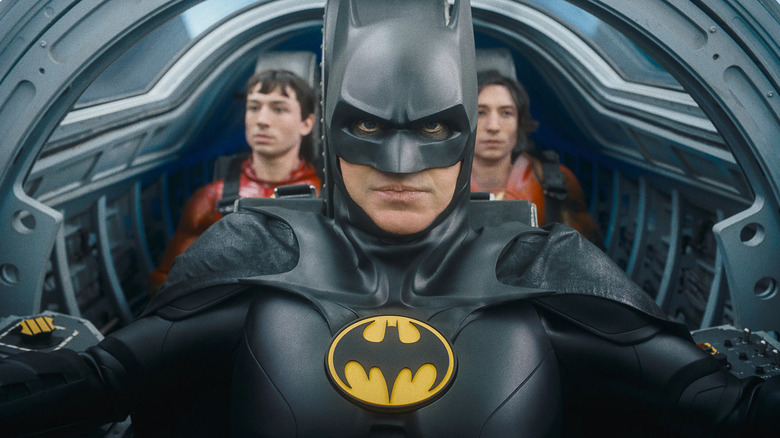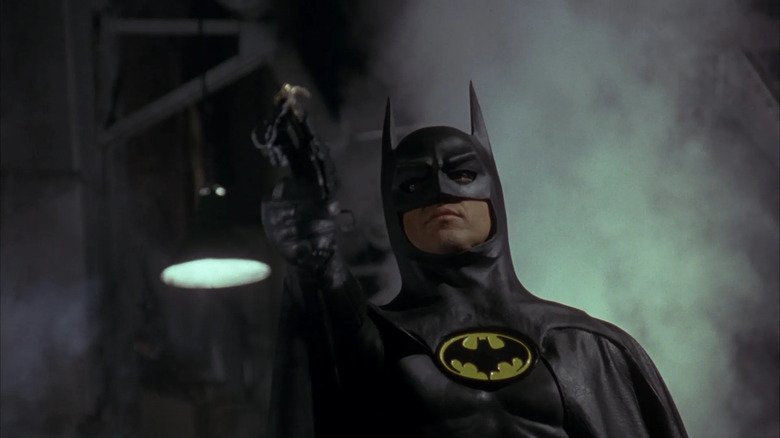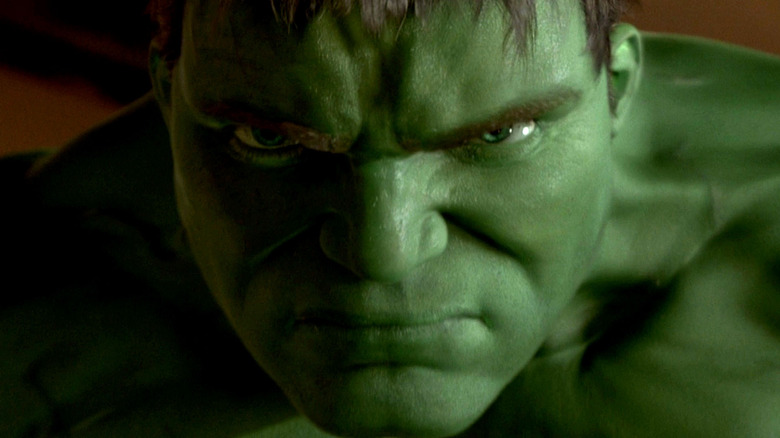The Flash Score Brings Back Familiar Batman Sounds From 1989
The music for Andy Muschietti's new superhero flick "The Flash" was composed by Benjamin Wallfisch, who previously worked on films like "Hidden Figures," the "It" movies, "Blade Runner 2049," and "The Invisible Man." Before "The Flash," he also wrote the score for Ron Howard's "Thirteen Lives," as well as the superhero films "Shazam!" and "Hellboy." Wallfisch, it seems, has a great deal of range as a composer. He has also worked with Adele and Pharrell Williams and has over 30 albums to his name. Wallfisch is a name that pop film buffs ought to know.
Wallfisch is also wise. He knew that he was going to be writing the music for a superhero movie that, because of its multiverse-related plot, was going to incorporate a few familiar faces from several older movies. Not only does Michael Shannon reprise his role as General Zod from the 2013 film "Man of Steel," but Michael Keaton returns to play the version of Batman he depicted in Tim Burton's 1989 "Batman" feature film. There are additional cameos and surprises, but I shall not discuss those here.
Wallfisch, then, included a lot of noticeable quotations from Danny Elfman's famous score for the 1989 feature film. The rising, Gothic Batman theme can be heard in several scenes that take place in the character's Batcave. It should be noted that Elfman's "Batman" score has served as perhaps the primary template for most superhero movie scores to have come since. Elfman's bold, trumpet-forward orchestrations were already a genetic part of Wallfisch's "The Flash" themes, so it felt completely organic when Elfman's own strains struck the keen ear. It works surprisingly well.
The Elfman sound
Danny Elfman first started writing music in the late 1970s as part of the Mystic Knights of the Oingo Boingo, a raunchy and surrealist performance troupe founded by his brother, Richard Elfman. Richard ended up directing "Forbidden Zone" (which Danny scored) and other exciting, weird cult movies, while Danny took over the Oingo Boingo name and transformed it into one of SoCal's better New Wave bands. In 1985, Elfman scored his second movie, "Pee Wee's Big Adventure," for director Tim Burton. This started a lucrative working relationship, and Elfman returned to score the bulk of Burton's films.
1989's "Batman" was the eleventh (!) film Danny Elfman scored, and his music took a lot of cues from Igor Stravinsky's "The Firebird Suite." It was an intense and more sinister score from the bold, open-faced heroic of John Williams' "Superman" themes, perhaps the most famous superhero score ever penned. Because "Batman" was such a massive financial success, many studios immediately began to reach for a similar musical sound, and Elfman would eventually be hired to score movies like "Dick Tracy," "Darkman," as well as the theme song to "Batman: The Animated Series" and the 1994 "The Flash" TV series. Perhaps frustratingly, Elfman's "The Flash" theme is not used in the new "The Flash" movie. Most superhero movies since "Batman" owe Elfman a debt.
Elfman's music involves a lot of choral work, tinkling chimes, and minor keys. His sound became a default for anything with a Goth look. Broody kids of the 1990s can likely hum several of his scores by heart; "Beetlejuice," "To Die For," "Tales from the Crypt," and "The Frighteners" are part of this '90s teen's DNA. Even his more sentimental scores, like his work for "Black Beauty," bore the Elfman sound.
The non-Elfman sound
Sometime in the early 2000s, however, Elfman began intentionally expanding his sound, and he left a lot of his known sounds behind. He would crack them out again for Burton, but for other directors, Elfman would try out new things. The turning point might have been "Hulk," the 2003 superhero film he worked on for director Ang Lee. In a behind-the-scenes interview on the film's DVD, Elfman talked about how Lee deliberately didn't want Elfman to sound like himself. The composer took it as a challenge. Ever since, Elfman has expanded considerably, turning into a more versatile music maker. Sadly for the man's many fans, it meant that his signatures were all gone. The "quirky" Elfman was replaced by a more egalitarian one. The scores for "Avengers: Age of Ultron" and "Justice League" are wholly different from "Batman" and "Dick Tracy."
Elfman's classic signatures still pop up from time to time, though. Elfman has made a great deal of money performing his older film score live in a concert setting, and — as with "The Flash" — even gets to see them brought back. Elfman also quoted his own "Batman" theme for the Ben Affleck Batman in "Justice League."
Now Wallfisch is using it again for "The Flash." This time, the themes aren't subtle. This is Michael Keaton wearing the same suits and using the same vehicles from Burton's 1989 film, so Elfman's score is now full-throated and unambiguous. Fans of the 1989 film — and they are legion — will hear them and sink into a put of comfort. That Wallfisch was able to incorporate the classic Elfman sound into his own "Flash" themes speaks volumes to the younger composer's talents.


